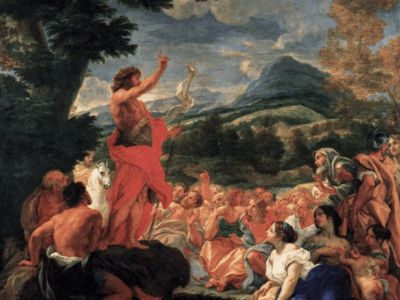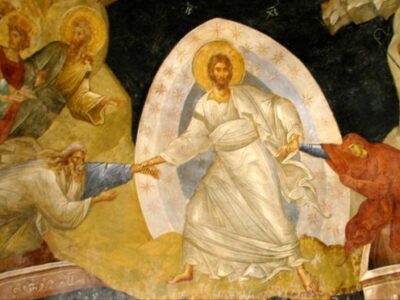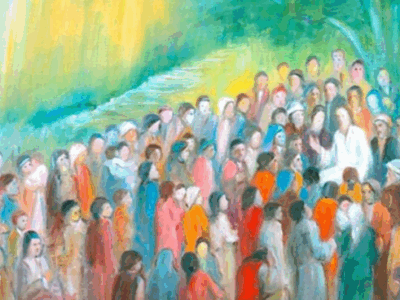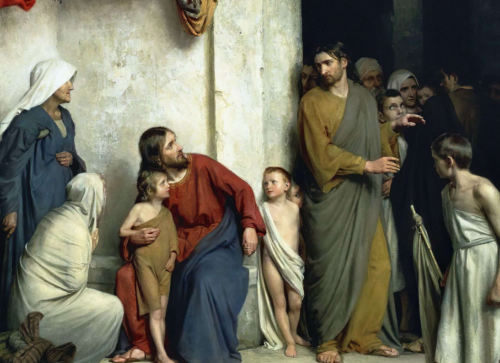Saints and Sinners Both
Year C
Sirach 35:12-17
Psalm 84:1-6
2 Timothy 4:6-8,16-18
Luke 18:9-14
May the words of my mouth O God… speak your truth…
The Book of Sirach was written during the four-hundred-or-so year period… after the last book of the Jewish Testament… Malachi… was written… and before the first book of the Christian Testament… 1 Thessalonians… was written… which was around the year fifty… the Book of Sirach is one of the books currently in the “second canon” … the apocrypha… and was… according to Professor Micah Kiel at St. Ambrose University in Davenport… considered to be a part of the original canon for most of the history of the Church… especially in the west… Books such as Tobit… 1 Maccabees… and Sirach… he wrote… were quoted by early church figures… and likely influenced the Christian Testament…
The Book of Sirach… or The Wisdom of Ben Sira… the Son of Sira… is a good test-case for the importance of such books… because Jewish leaders… authors… and thinkers… during the almost six-hundred year Second Temple period… were scrutinizing their own traditions… often asking hard questions… we see this in the book of Job… for example… which struggles with the problem of undeserved suffering… but also with bigger questions like… How can we know what God does… and why… and as in Proverbs… Sirach consistently recommends fear of the Lord… which doesn’t mean for us to be scared of God… but to observe not only the sage’s teaching of the Law… but the Law itself… which was understood to guarantee God’s blessing…
In our reading from 2 Timothy… Paul writes to Timothy of his coming death… in the missing verses 9-15… he names three men who have deserted him… and asks Timothy to come to him soon… since only Luke is with him… and that when he comes… to bring Mark… the cloak that Paul left with Carpus at Troas… his books… and above all… the parchments… and he conveys his confidence to Timothy… that he has fought the good fight… that he has finished the race… metaphors for being faithful to his calling… and a not-so-subtle reminder that the generous and gracious One who bestows the crown of righteousness… also waits for us when we finish our own races…
Jewish… New Testament scholar… Amy-Jill Levine… writes that two men go up to the Temple to pray… one righteous and one sinful… one honored as a popular leader and respected teacher… and one despised as a collaborator with the Roman government… one who has an abundance of good deeds… and prays a prayer of thanksgiving… and the other… a self-identified sinner… who simply asks for mercy… and because Jesus’ story is a parable… and because parables do the unexpected… we might expect the sinner to turn out to be a saint… and the saint to turn out to be a sinner… But in the long run… she writes… our conventionally unconventional reading about a reversal of status… gets us nowhere… because this reading matches the traditional views of the Prodigal Son… the Pharisee in the Temple… like the elder brother in the field… is understood as engaging in works-righteousness… and refuses to accept the repentant sinner… while the prodigal and the publican are both regarded as saved by grace… and the message of the parable becomes one in which it’s better to be a repentant tax collector… than a sanctimonious Pharisee… and by extension… that it’s better to be a Christian saved by grace… than a Jew who rejects others and teaches salvation by works by following the Law… but neither the Pharisee nor the the tax collector behave in a way that a first-century Jewish audience would expect… they’d be surprised that such a leader would be dismissive of others… and surprised that a tax collector would be repentant… because according at least to Luke… tax collectors were rich… well connected… and ostentatious enough to host banquets… and so it’s admirable that the tax collector asks for mercy… but if his request to God isn’t accompanied by a resolve to stop sinning… all it invokes is cheap grace…
In today’s Gospel… the Pharisee says… God… I thank you that I am not like other people… thieves… rogues… adulterers… or like this tax collector… a man who may well have been caught between a rock and a hard place… perhaps an unskilled worker with several mouths to feed… just trying to get by as so many do these days… and collecting taxes for the Romans may have been repugnant to him… the only thing he could do… and the fact that he was in Temple… asking God for mercy… doesn’t tell us whether he wrongly extorted those from whom he collected to collect more… or whether he rightly followed John the Baptist’s instruction in Luke 3:12-13 when the tax collectors came to be baptized… and they asked him… Teacher, what should we do? and John answered… Collect no more than the amount prescribed for you… maybe that’s what he did… and I wonder whether… and how often… any of us… Episcopalians or Lutherans or not… Christians or not… religious or not… say what the Pharisee said about our own neighbors… that’s a message my own internal tapes sometimes do…
In today’s Gospel… Jesus said that all who exalt themselves will be humbled… and all who humble themselves will be exalted… it’s the same kind of parable message Jesus shared four chapters ago in Luke… when he talked about how wedding guests chose the places of honor… and how he warned them not to do so in case someone more distinguished came and the host had to ask them to move lower… but to first sit at the lowest place… so that if the host came and said… Friend… move up higher… they would then be honored in front of everyone… I mean… a more contemporary way to frame this is to honestly answer the question… How full of myself… am I… and the bite comes as soon as… like the Pharisee… we decide that we’re better than anyone else… the problem is comparison… we need to just come to God as we are… because God’s mercy is big enough to cover us…
Verse 13 of Sirach says… For the Lord is the one who repays… and he will repay you sevenfold… that sounds like a pretty good return on investment… doesn’t it… it sounds a lot like what’s called the Prosperity Gospel… a belief among some Christians that God rewards with material wealth… those who live faithful lives… and one man who promoted that belief… was an assistant pastor… who became known as Rev. Ike… and whose weekly radio sermons were carried by hundreds of stations across the country… he was famous for his “Blessing Plan”… listeners… including me when I was in college and eating ramen noodles… sent him money… and in return he blessed them… he said doing this would make his listeners more prosperous… if they just… had… the right… attitude… but he was criticized for his noticeable interest in making money too… and he made a lot of it…
But the return on investment promised by Sirach… doesn’t always materialize… at least not always in the ways we wish they would… and in the healing racism Sacred Ground course I’m taking… we’re learning about the obstacles which prevent those who fight the good fight… who follow all the rules… and who even ask for mercy… from getting any return on investment… that the systemic evils which engulf us fail to provide social justice for far too many… and too many who perpetuate these systemic evils make money hand over fist…
Professor Kiehl writes… it’s interesting to consider how this text from Sirach sits alongside the parable of the Pharisee and the tax collector… while Sirach’s theological ideas might differ from Luke’s… they both share a conviction that God is the ultimate judge and that not only an outward adherence to obedience… but an inward transformation is required of a person of faith… in Sirach… those things sacrificed to God must be gained honestly… and it helps us to remember that it’s the means by which we express our faithfulness and gratitude in response to God’s generous grace… we bring gifts to God not as charitable owners… or sly negotiators… but as humble stewards… and stewardship is not about courting God’s favor… but responding to it with gladness… and during this year’s stewardship season… I think these are interesting questions to consider…








